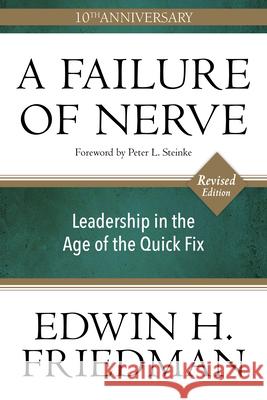A Failure of Nerve, Revised Edition: Leadership in the Age of the Quick Fix » książka
A Failure of Nerve, Revised Edition: Leadership in the Age of the Quick Fix
ISBN-13: 9781596272798 / Angielski / Miękka / 2017 / 288 str.
- Foreword by Peter Steinke - Magnum opus of leading figure in application of family systems theory to congregations - Widely used in seminary and continuing education since 2007 first publication - Revised 10th anniversary edition of best-sellerTen years after his death, Edwin Friedman's best-selling A Failure of Nerve continues to offer insights into leadership that are more urgently needed than ever, and this revised, anniversary edition is essential reading for all leaders, be they parents or presidents, corporate executives or educators, religious superiors or coaches, healers or generals, managers or clergy.
Friedman was the first to tell us that all organizations have personalities, like families, and to apply the insights of family therapy to churches and synagogues, rectors and rabbis, politicians and teachers. His understandings about our regressed, "seatbelt society," oriented toward safety rather than adventure, help explain the sabotage that leaders constantly face today. Suspicious of the "quick fixes" and instant solutions that sweep through our culture only to give way to the next fad, he argued for strength and self-differentiation as the marks of true leadership. His formula for success is more maturity, not more data; stamina, not technique; and personal responsibility, not empathyA Failure of Nerve was unfinished at the time of Friedman's death and originally published in a limited edition. This new edition cleans up some oversights in the original and brings his life-changing insights and challenges to a new generation of readers.
"Reading this book is like discovering an unpublished Beethoven sonata or a missing play of Shakespeare. Ed Friedman was one of our most brilliant, original, and provocative thinkers across the fields of therapy, ministry, and organizational leadership."
--Professor William J. Doherty, Director, Marriage and Family Therapy Program, University of Minnesota
Audience: Clergy, vestries, other lay leaders. Those interested in how they can adapt to the change they see coming while retaining core identity. Seminary, continuing education, CPE, small groups. Broad reach to all leaders, not just those of congregations.











